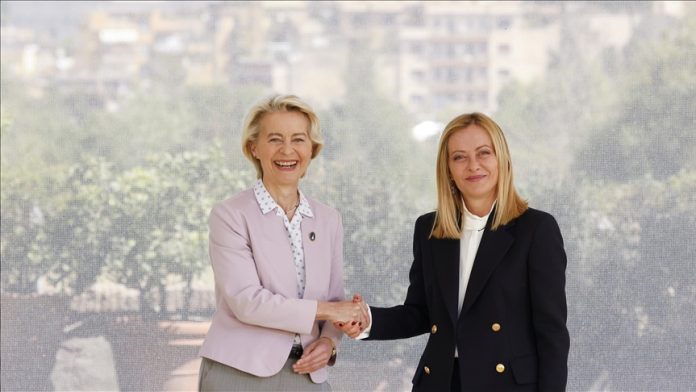The European Union and Italy intensified efforts to strengthen relations with Africa, announcing a suite of agreements valued at €1.2 billion, Euractiv reported.
These initiatives focus on enhancing railway infrastructure, boosting digital connectivity, and promoting climate-resilient agricultural practices across the continent.
The landmark deals were unveiled at a high-level summit in Rome co-hosted by Italian Prime Minister Giorgia Meloni and European Commission President Ursula von der Leyen.
Meloni positioned the event as pivotal for Italy’s Mattei Plan, a strategy championed by her government since its launch in November 2023 aiming to mobilise at least €4 billion in Italian funding over five to seven years.
We believe Africa is the continent where our future is most at stake. Italians and Europeans alike are called upon to make a difference – and we can.
The Mattei Plan draws its name from Enrico Mattei, the influential founder of Italy’s state oil company Eni. Mattei’s post-war vision for energy partnerships in Africa was characterised as democratic and equitable, explicitly rejecting resource exploitation.
Aligning European strategies
Friday’s summit represented a significant step towards synchronising the Italian-led Mattei Plan with the EU’s overarching Global Gateway strategy. This ambitious Brussels agenda commits €300 billion to global connectivity and development, allocating half specifically for Africa.
Von der Leyen framed the joint initiative as a countermeasure to recent global reductions in development assistance.
We see that other countries around the world are cutting their funding. We think this is wrong. Attracting new investment to Africa is in both our interest. And today’s event shows that our approach is delivering.
Key projects receiving backing include substantial support for the Lobito Corridor. This critical 830-kilometer railway project will link Angola and Zambia via the Democratic Republic of the Congo, with future extensions planned towards the Tanzanian coast. The EU committed nearly €1 billion to this venture, incorporating €77 million in grants designated for Angola.
Another major announcement concerned the expansion of the Blue Raman undersea cable system. Initially designed to connect India to Europe via the Gulf and Djibouti, von der Leyen confirmed that, through partnership with Italy, the cable will now extend its reach to include Somalia, Kenya, and Tanzania. Prime Minister Meloni additionally introduced a major debt relief initiative developed with the European Commission.
The plan foresees converting, over the next ten years, the full debt burden of the world’s least developed countries, and slashing by 50% the debt owed by lower-middle-income nations.
However, despite the breadth of announcements, civil society groups maintain a stance of scepticism. Critics highlight persistent concerns regarding dedicated funding streams and insufficient coordination with the very African nations the plan intends to benefit. African Union Commission President Moussa Faki openly acknowledged this shortfall last year, criticising the initial lack of consultation.
Further criticism points to a perceived imbalance in the Mattei Plan’s fundamental priorities. While presented as a partnership of equals, many observers interpret it primarily as a vehicle to advance Italian strategic objectives. These include curbing irregular migration, securing energy supplies, and enhancing health security.
The coalition Don’t Gas Africa, representing over 80 African organisations, has denounced the strategy as “neo-colonial” and exclusionary. They cite inadequate consultation with local communities and a failure to substantively support a just energy transition on the continent.
